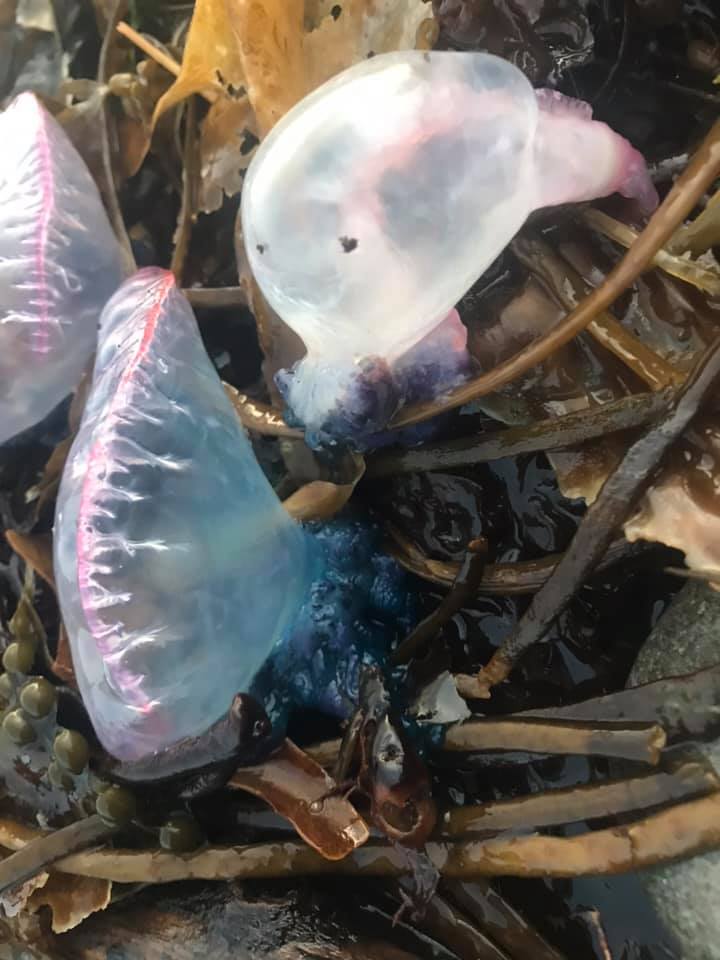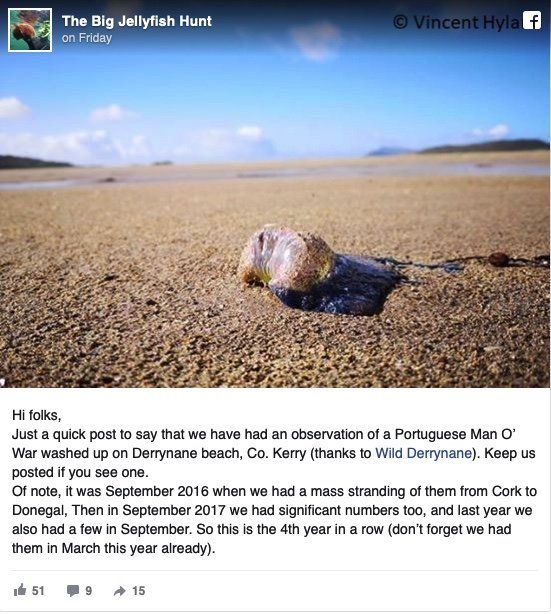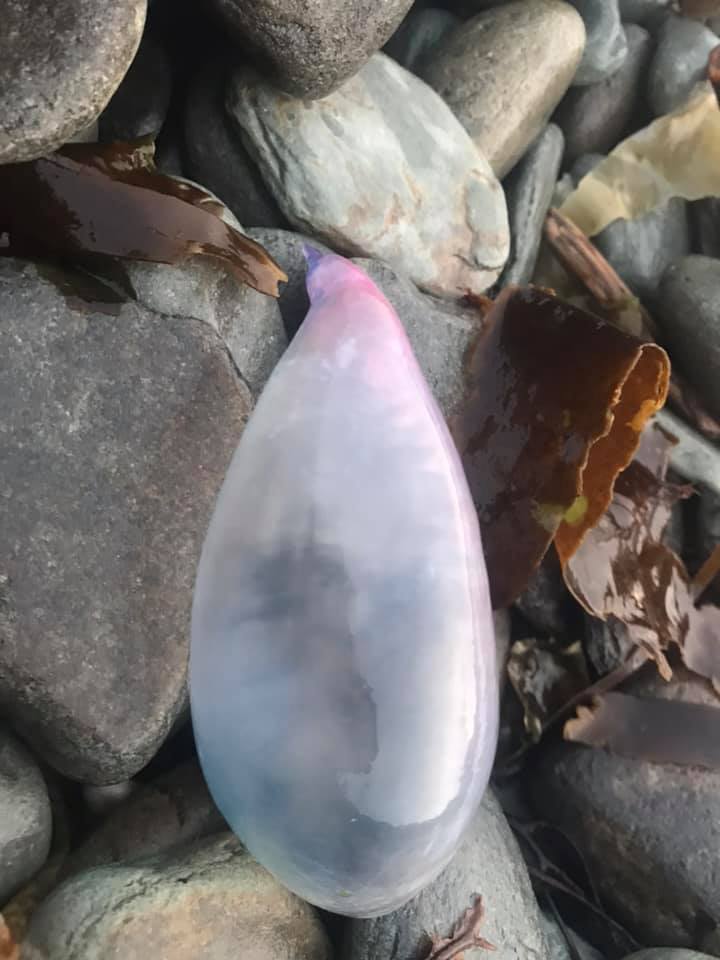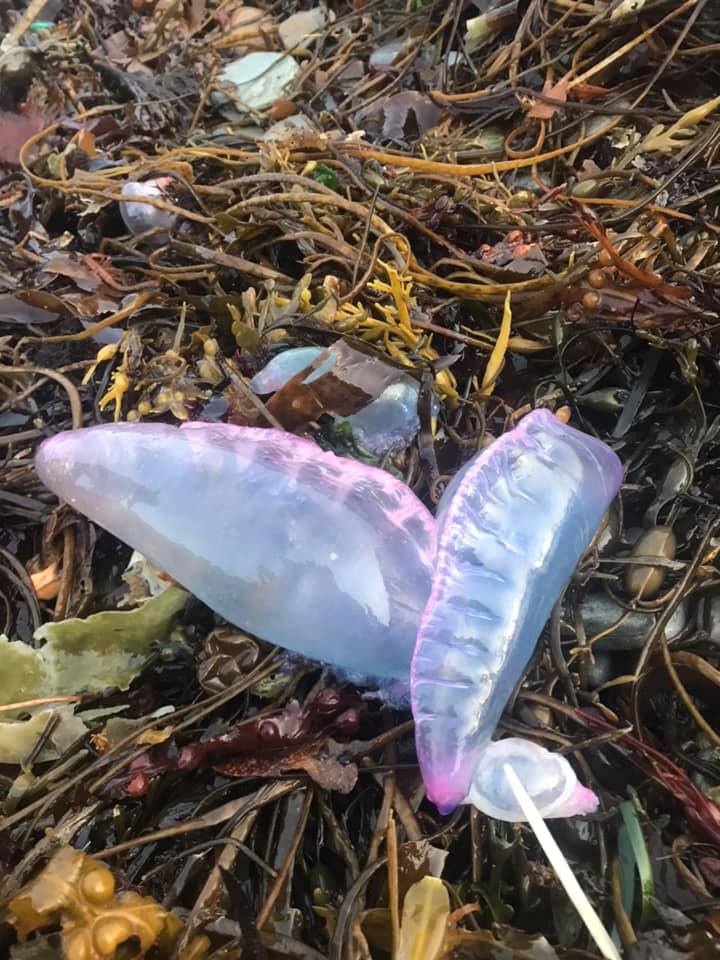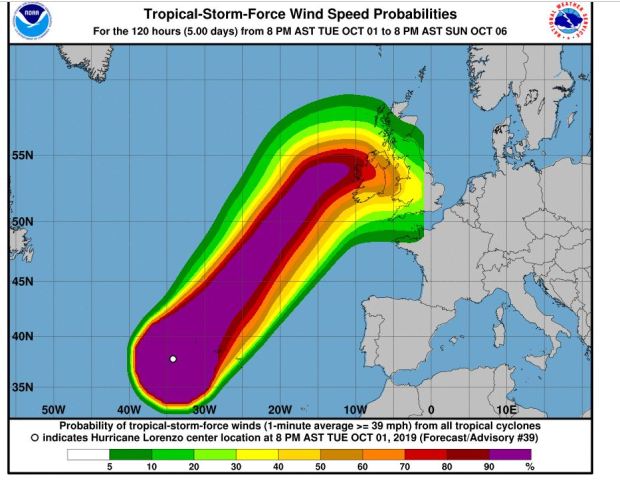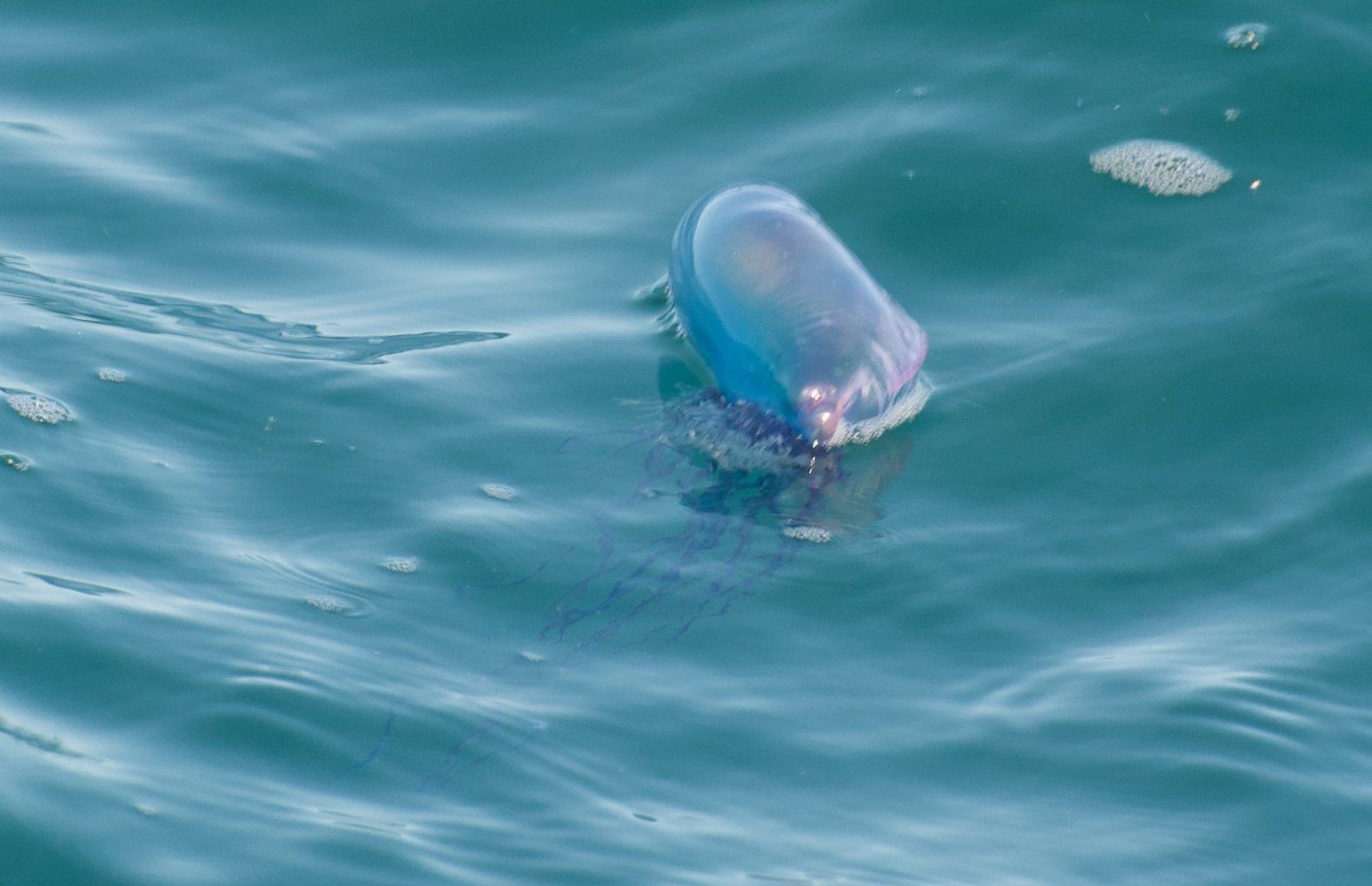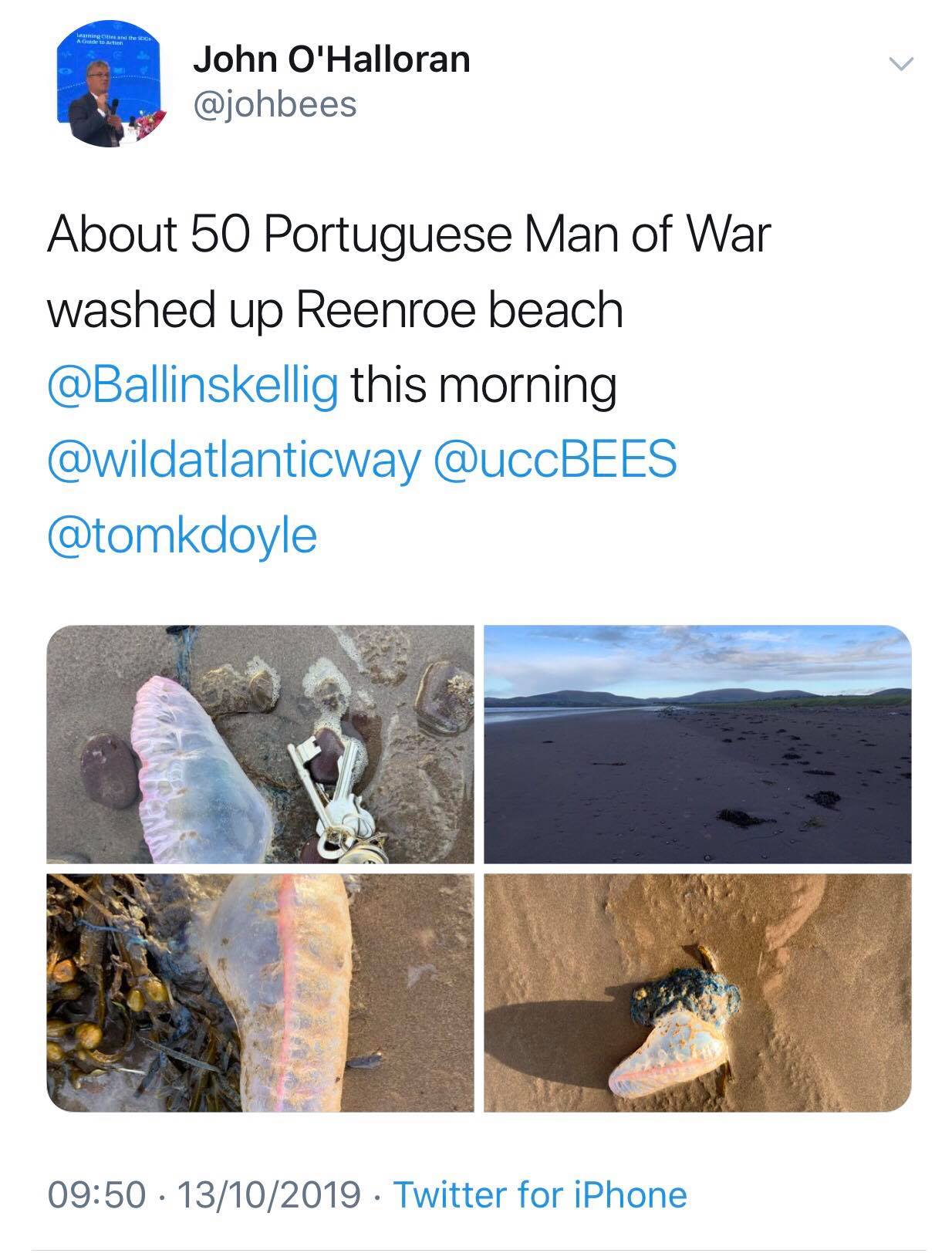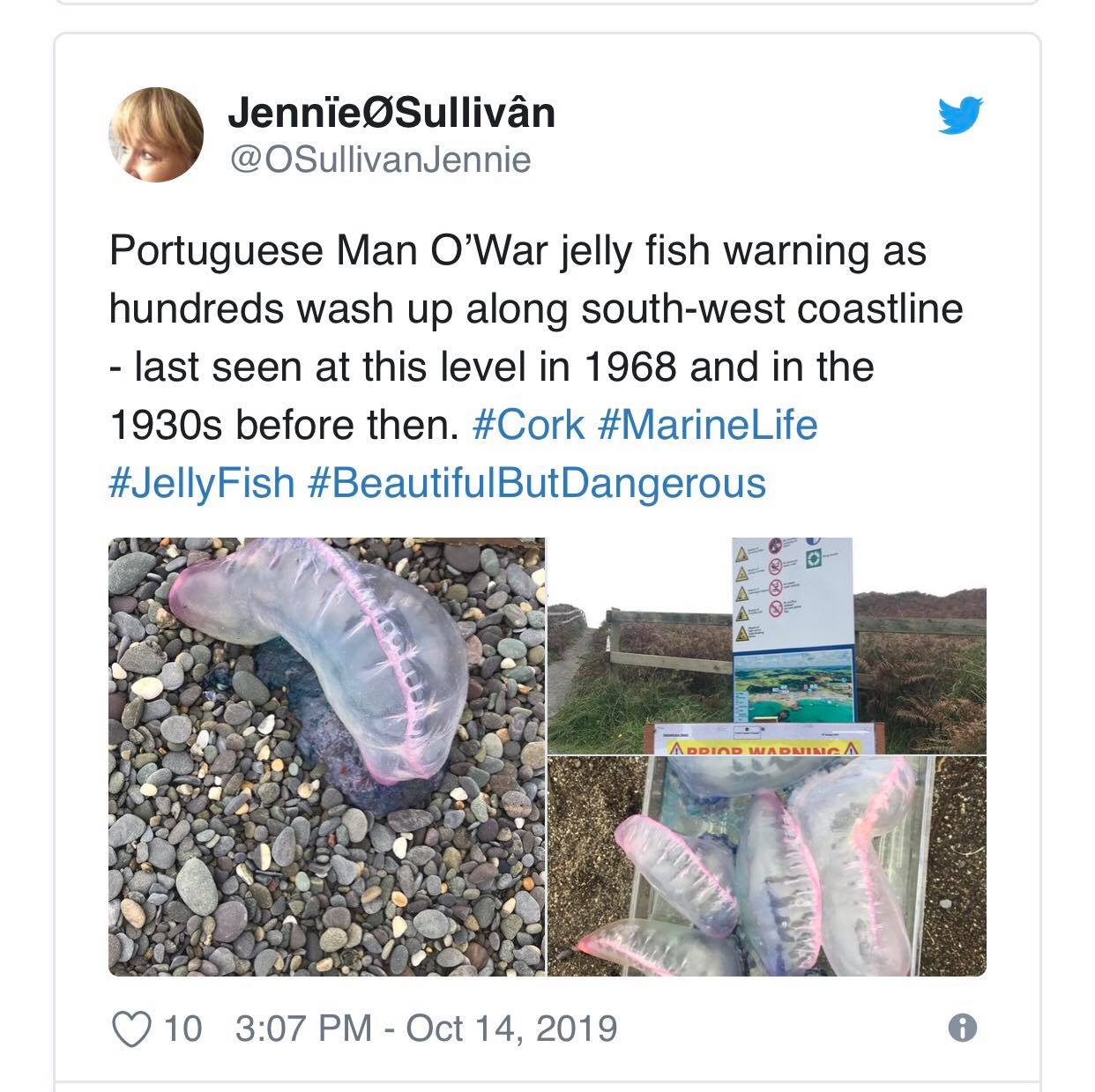Portuguese Man-O-War wash up along the south-west coasts of Ireland.
Dozens of Portuguese man-o-war have been washed up along the coasts of Kerry, and West Cork in recent days. These jellyfish like animals were uncommon prior to 2016, but now seem to be arriving on our shores on an annual basis. We explore the recent sightings and discuss what may be bringing these dangerous marine invertebrates to Irish waters.
Fig 1. Portuguese Man- O -War stranded on South Harbour, Cape Clear Island on September 30th 2019. Copyright @ORCireland2019.
Large numbers of Portuguese man-o-war ( Physalia physalis),
the Atlantic's most venomous marine organisms, have been reported in great numbers on Irish shores seasonally since 2016, and 2019 has been no exception to the recent trend of these dangerous jellyfish-like marine invertebrates.
In March 2019, there was reports of a few washed up along the west coast of Ireland. Similarly to previous years, most have stranded in September/October, with over 30 reported previously by Vincent Hyland of Wild Derrynane and "The Big Jellyfish Hunt" (Fig 2) and 16 recorded on South Beach on Cape Clear Island, West Cork (Fig 3 & 4).
Fig. 2. Screenshot of "The Big Jellyfish Hunts" Facebook post.
The Portuguese man-o-war, also known as the "man-o-war", is a marine hydrozioan found in the Atlantic, Indian and Pacific Oceans.
The man-o-war is a venomous siphonophore, an animal made up of a colony of organisms that work in tandem to feed and perpetuate. It comprises of four separate polyps. The uppermost polyp is what is most clearly visible above in Fig. 1, this is a gas filled bladder, or pneumatophore, which sits above the water and somewhat resembles an old warship at full sail. In some parts of the world, man-o-war are also known as "bluebottles" due to the purple/blue colour of their pneumatophore.
Fig. 3 Pneumatophore of the man-o-war washed up on Cape Clear Island, Co Cork on the 30th of September 2019. Photo by: Emer Keaveney.
The tentacles are the animals second organism which comprise of long tendrils which can reach 10 meters in length. These are covered in venom filled nematocysts used to paralyse and sting prey. For a human a sting from a man-o-war can be extremely painful, but rarely deadly. Muscles in the tentacles guide prey to a polyp with the digestive organisms, known as the gastrozooids. A fourth polyp contains the reproductive organisms.
Generally man-o-wars are found in groups of up to 1,000, floating in warm waters through-out the world's oceans. As they have no direct means of propulsion they drift along with the currents and sail using their pneumatophores. So what are they doing here in Ireland? A few things we can consider may explain this.
Fig. 4 Two of sixteen Portuguese man-o-wars recorded on South Beach, Cape Clear, Co. Cork on the 30th of September, 2019. Photo by: Emer Keaveney.
Ireland is expecting "Storm Lorenzo" to hit by Thursday the 3rd of October. In the build up to this storm, Irish coastal areas are experiencing high winds and increased sea swells. The recent seasonal presence of man-o-war may be a result of warming oceans and an increased number of storms along our coasts. This highlights an issue which is of growing global concern, that of the Climate Crises!.
Fig. 5 Hurricane Lorenzo is heading our way. Credit: National Hurricane Center
Met Éireann have issued an orange wind warning for six counties and a status yellow warning nationwide from tomorrow evening and Friday morning, when Storm Lorenzo is expected to hit Ireland. The orange warning for Galway, Mayo, Clare, Cork, Kerry and Limerick will be in place from 6pm tomorrow to 3am on Friday.
Met Éireann stated: "southwesterly winds veering westerly will reach mean speeds 65 to 80km/h, with gusts generally of 100 to 130km/h, higher in coastal regions". Storm surges are expected to produce coastal flooding and damage, and two status yellow warnings were issued nationwide to come into effect during the storm.
UPDATE: On Sunday the 13th of October, over 10 Portuguese Man-O-War were seen adrift in the waters off West Cork by O.R.C. Marine Scientists on-board Baltimore Wildlife Tours. These are likely still washing ashore to do high winds and rain coming in from the Atlantic Ocean.
Portuguese man-o-war sighted by Ben Horgan in the waters off West Cork. Photo by: Emer Keaveney. Copyright @O.R.C.Ireland.
On the same day, Deputy President of University College Cork (UCC), Prof. John O'Halloran, reported around 50 of them on Ballinskellig Beach to jellyfish expert Dr. Tom Doyle.
According to Jennie O'Sullivan, the last time these marine invertebrates washed up on our shores was over half a century ago.
© Ocean Research & Conservation Ireland (ORCireland) and www.orcireland.ie , est. 2017. Unauthorized use and/or duplication of this material without express and written permission from this site’s author and/or owner is strictly prohibited. Excerpts and links may be used, provided that full and clear credit is given to Ocean Research & Conservation Ireland and www.orcireland.ie with appropriate and specific direction to the original content.
SHARE THIS ARTICLE






